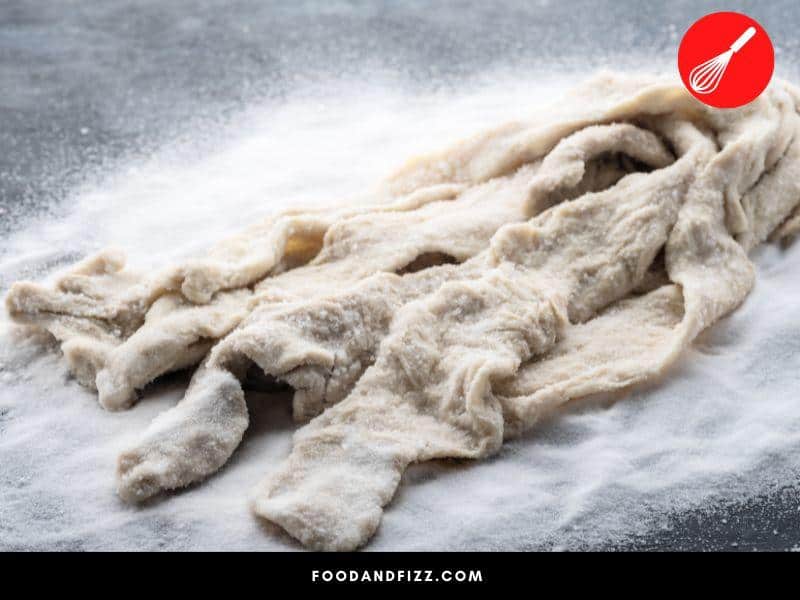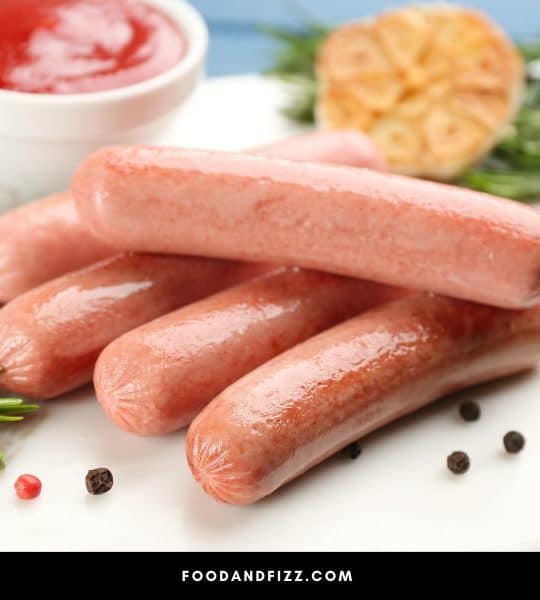The word sausage is typically associated with meat. However, sausage can also be vegan or vegetarian and be made with plant-based meat alternatives.
With the rise of veganism and vegetarianism, plant-based sausage is quickly becoming a thing, and more options and variations are quickly becoming available on the market.
We know that many types of sausage are encased in cleaned animal intestines, although synthetic casings are also common. This then begs the question, what do they encase plant-based sausages in? Do vegetarian sausage casings exist?
Here we’ll learn everything about vegetarian sausage casings.
What Are Vegetarian Sausage Casings Made Of?
Vegetarian sausage casing is typically made with vegetable glycerin, water, and natural polysaccharides. Vegetarian sausage casings are plant-based sausage casings not made from animal skin, intestines, or any animal-derived ingredients.

What Are Sausage Casings?
Sausage casing, also known as sausage skin, is the material that is used to stuff the sausage meat and is what allows them to have its elongated shape. This material is what holds the sausage filling. Sausage casings are usually edible and do not need to be removed prior to consuming the sausage. The article Do You Remove Casing From Sausage looks at this in depth.
There are different types of sausage casings available, depending on the type of sausage and the maker’s preferences.
Types of Sausage Casings
Sausage casings can be grouped into three categories.
1. Natural Casings
Natural casings are primarily made from the small intestines of animals like pigs, sheep, cows, horses, and goats. These are cleaned and flushed before being sold for use.

2. Artificial Casings
Artificial or synthetic casings are those that are produced or manufactured. They can be edible or inedible.
- Collagen – Edible casing made from the collagen of animals, usually from cow or pig hide. They have been around the longest. Some thicker forms of collagen casing like those in salami and thicker sausages are not edible and should be removed.
- Cellulose – Inedible casing made from viscose, a material that comes from wood pulp or cotton linter. This is what is usually used for frankfurters or wieners and is peeled off after cooking.
- Plastic – Inedible casing used for luncheon meats or bologna. Unlike cellulose casings, these are impermeable to smoke and water.
3. Vegetarian Casings
Vegetarian sausage casings are made from water, vegetable glycerin, and natural polysaccharides or carbohydrates that are similar to cellulose. All ingredients are plant-based and not derived from animals.
What Are Vegetarian Sausage Casings Made Of?
Technically, the inedible casings we just mentioned, cellulose and plastic, are vegetarian casings and may be used as such, however, all the edible casings we’ve encountered so far are all animal-derived.
This is where vegetarian casings come in. Completely edible and safe to eat, vegetarian sausage casings are made from plant-derived ingredients that mimic the texture and behavior of cellulose. They are typically made with water, vegetable glycerin, and water-soluble, natural polysaccharides.
An example of this polysaccharide is alginate, which is derived from seaweeds or algae. According to manufacturers of alginate gel, the texture and mouthfeel of casings made with alginate gel resemble or are indistinguishable from natural or cellulose casings. It gives the sausage a pleasant bite.
Manufacturers believe that sausage casings made from alginates are the more sustainable option.

Advantages of Vegetarian Sausage Casings
Natural or cellulose casings may be the current standard but vegetarian sausage casings do offer some notable advantages.
- Sustainably sourced – main ingredient, alginate, comes from seaweeds
- Cheaper to produce – machines are more efficient, raw materials are easily procured, and less labor and energy to produce
- Consistent in quality and size – natural casings can be irregular and inconsistent in appearance
- Customizable -manufacturer can easily customize size and thickness of their casings
- Ready to use – do not need soaking like their animal-derived counterparts
- Vegetarian and Vegan Friendly – provides an edible option for those with special dietary requirements
Disadvantages of Vegetarian Sausage Casings
- Can be harder to find – only specialty stores would carry it
- Can be more expensive for the consumer – because it is hard to find, it can be more expensive
- Limited cooking methods – may not hold up to high heating and cooking methods
- Can be more fragile and may break easily – water soluble, so it has to be handled properly to prevent breakage.
How To Store Vegetarian Sausage Casings
If not properly stored, vegetarian sausage casings can go bad and be unusable. As they are fragile, they need to be stored properly in a cool, dry place.
Remember that vegetarian sausage casings are water-soluble, so any exposure to moisture or any extreme change in temperature may cause damage to them. They should be properly stored in a container that is airtight. Stored in this way, they will last between 1 to 1 ½ years.
How to Use Vegetarian Sausage Casings
Vegetarian sausage casings do not need soaking and are simple to use. Following the manufacturer’s instructions and reminders will ensure that you will not run into problems when you make your vegetarian sausage.
Some important things to keep in mind:
- Vegetarian sausage casings are water-soluble, so it is important to handle them with dry hands
- Unlike natural casings made from animal intestines, vegetable casings do not need soaking. You can use them immediately
- Casings should not be overstuffed as they can burst and tear and destroy your sausages
- Do not boil, poach, or deep fry your sausages as they can destroy the casings. Pan-frying in a little oil, baking, and grilling is possible, with care.
- They may be cooked on the stovetop on low to medium heat, in the microwave at intervals of 15 seconds, and in the air fryer for no longer than 10 minutes.
Vegetarian sausage casings are simple to use and if you’re ready to jump into making plant-based sausages, an interesting recipe to start can be found here.
If you are careful with handling your vegetarian sausage casings, you can successfully create deliciously appealing vegetarian, and even vegan sausages that will rival their meat counterparts.
Even if you aren’t vegetarian or vegan though, these vegetarian sausage casings, pegged as the “sausage casings of the future” might be worth a try.
Alternatives to Vegetarian Sausage Casings
If you cannot find vegetarian sausage casings, you may opt to use inedible casings like cellulose and plastic, making sure to remember that these should be removed prior to consumption. You may also opt to make skinless sausages, or make your own casing from rice paper.

What Can I Use To Make Vegetarian Sausage?
Vegetarian sausage can be made with so many things. They can be made with plant-based meat alternatives that are usually made with soy or wheat protein, beans, chickpeas, mushrooms, tofu, tempeh, and even grains like polenta or quinoa.
There are many possibilities and flavor combinations that you can use to make a delicious vegetarian or vegan sausage.
Is Vegetarian Sausage Healthier?
Vegetarian sausage can be healthier, depending on the ingredients used.
If it is made with too much sugar, chemicals or additives, or unhealthy ingredients just to make them taste like regular meat sausage, then it is not a good idea to keep consuming them.
They will probably carry the same inherent risks in processed food as their meat counterparts.
As with anything, it is important to always check the ingredients of what we are buying and consuming to make sure that what we are putting into our bodies promotes health.
If the ingredient list has ingredients we can’t pronounce or recognize, it is probably best to stay away from them. It is important to check ingredients always and choose reputable brands.
Making your own vegetarian sausage will give you more control over the process, and allow you to choose the ingredients that will go into your sausage.

Is Vegetarian Sausage The Same As Vegan Sausage?
Vegetarian sausage is not the same as vegan sausage. While they both do not contain meat from animals, vegetarian sausages may sometimes contain ingredients like eggs, cheese and milk.
Especially if you are vegan, it is important to always check the labels and check the ingredients so that you are not unnecessarily consuming what you cannot have.
Frequently Asked Questions to Everything About Vegetarian Sausage Casings
What Are Seaweed Sausage Casings?
Most vegetable sausage casings are made from alginate, a natural polysaccharide or carbohydrate derived from seaweed.
What Are Synthetic Sausage Casings?
Synthetic sausage casings can either be made of plastic, cellulose or collagen. Collagen is derived from the hides of cows or pigs and is mostly edible except for the thick ones used for salami. Cellulose and plastic are inedible sausage casings.
What Is In Vegetarian Sausage?
Vegetarian sausage may be made from soy or wheat protein, beans, chickpeas, fruits, vegetables, tofu, mushrooms, or grains like quinoa or polenta. There are many ingredient possibilities.
Conclusion to Everything About Vegetarian Sausage Casings
Vegetarian sausage casings are edible and are made from water and plant-derived ingredients and polysaccharides.
When used properly, they can be almost similar to the ones that are animal-derived. Because of the rise in veganism and vegetarianism, the demand for vegetarian sausage casings is quickly increasing, and as such, we may see that they will become more readily accessible to us in the near future.

